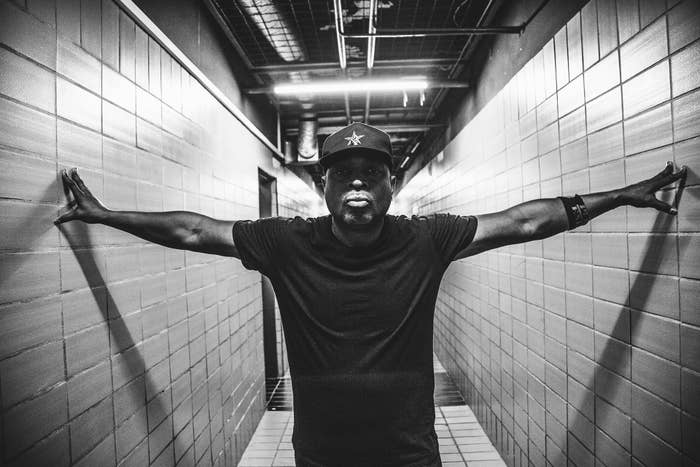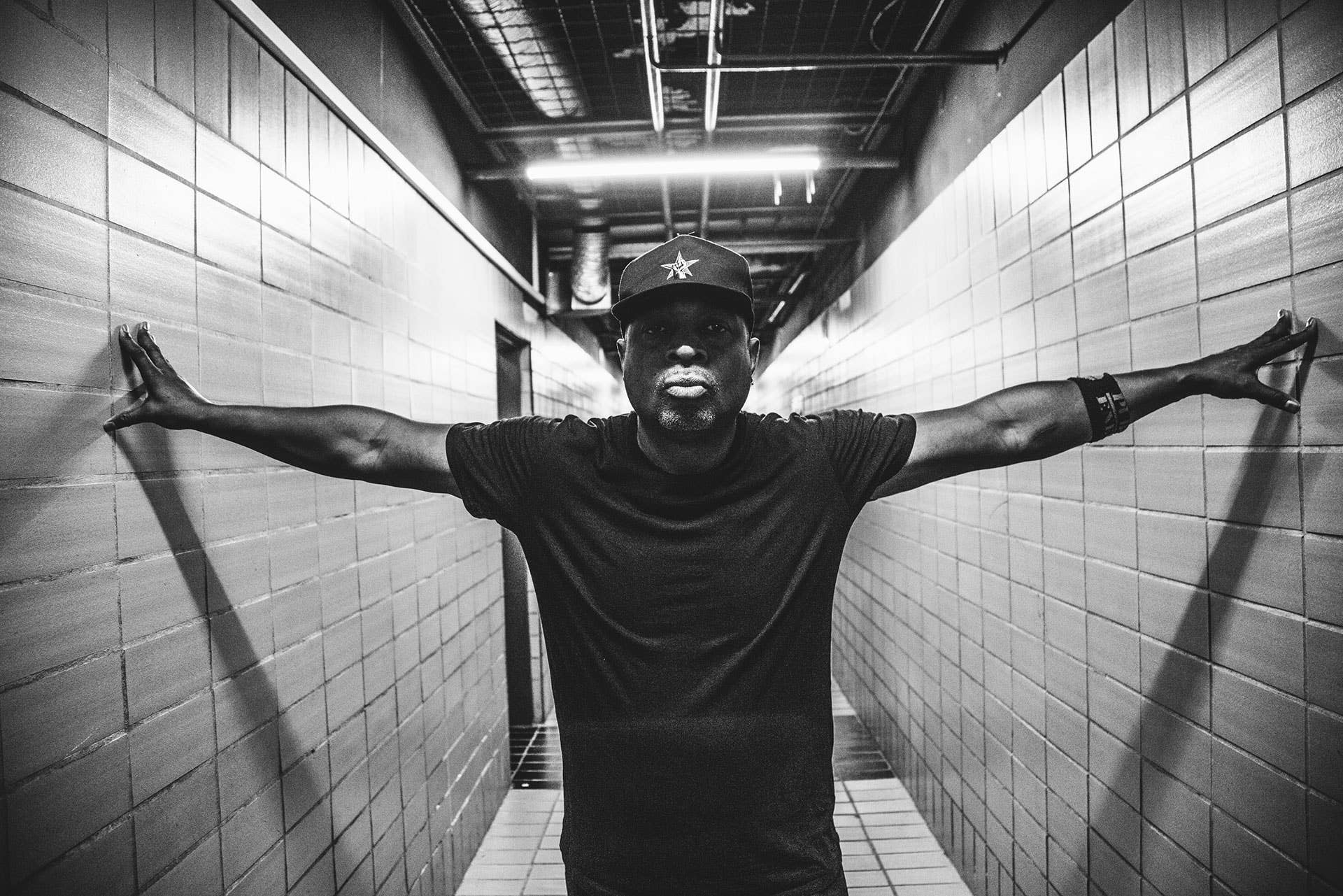
On June 9, Chuck D, founder and leader of pioneering hip-hop group Public Enemy, will receive the first-ever Social Justice Honours Award at Canadian Music Week in Toronto.
CMW’s president Neill Dixon said in a statement that the legendary rapper is receiving the honour “for using every opportunity throughout his career to speak his mind and stand up for what is right. Chuck is a champion and an innovator with the unique ability to identify new platforms to get his message across.”
As part of the award presentation, the Long Island-born innovator is the keynote speaker “in conversation” with Canadian-born Merck Mercuriadis, founder and CEO of song management company Hipgnosis Songs Fund Ltd, which has been buying up song catalogues of established artists, including Justin Timberlake, Red Hot Chili Peppers, and Neil Young.
Last time Mercuriadis was at CMW, in 2019, during his onstage chat with Eurythmics co-founder Dave Stewart, he announced the purchase of the songwriter-producer’s catalogue. But that doesn’t appear to be what’s happening this time.
Though Chuck will be in town for the ceremony, he seems ambivalent about accepting the award itself. “Awards to me are a waste of time,” he tells Complex Canada.
Instead, he’s more interested in using the platform to speak his mind. The rapper, who does a weekly radio show on Rapstation called ...ANDYOUDONTSTOP!, is involved with a multitude of projects—from social activism to visual arts—and has a life-lived perspective on the industry, so he will surely give people much food for thought.
Ahead of the CMW event, Chuck D chatted with us about receiving the award, Canada’s Black music business collective ADVANCE, what’s getting in the way of making the music industry more equitable, and why artists need to stop playing the numbers game.
Tomorrow, you will be receiving the inaugural Social Justice Honours Award at CMW, during your keynote conversation with Merck Mercuriadis. What does that mean to you?
I totally disregard getting any award my way. Obviously, the opportunity to speak in a keynote type of way at Canadian Music Week, that’s more important to me. Awards to me are a waste of time. But I definitely understand that it’s more promotional.
Speaking of someone that appreciates songwriters, how did you meet Merck? In the past at Canadian Music Week, he’s had some big announcements. Has he bought your Public Enemy catalogue, and what is your view of selling your catalogue, your legacy?
I don’t know. This will be the first time we sit and talk and if there’s any award coming to me, I hope it’s for like three seconds because I’m not there for that.
So you’ve never met him before?
Not that I recall.
Are you aware of him and Hipgnosis?
As much as I should. My people up in Canada are [hip-hop artists] Michie Mee and Maestro and [music journalist/CBC host] Errol Nazareth. I got folks up in Toronto, in Canada. As far as business people, we ain’t did no business.
“This whole thing of ‘I got social media and I got followers,’ that’s a f*cking illusion. I don’t have 694,000 people on Twitter; Twitter has 694,000 people.”
Merck doesn’t live in Canada anymore. He’s been buying up song catalogs of some major artists, most recently Justin Timberlake’s for about $100 million. I’m sure he’ll explain it to you when you meet, better than I ever could.
When you are in Toronto, you will probably hear about ADVANCE, Canada’s Black music business collective, which launched the summer George Floyd was killed [2020] and the Black Lives Matter global movement took off. It’s an organization to help build a more equitable industry here in Canada, providing more opportunities for young Black people, as well as advancement in their careers to executive positions. Do you see anything similar in the U.S. music industry?
The United States is a vast situation that’s over-bloated, overloaded. It hasn’t figured out ways to handle its population properly. Therefore, the lesser populations in Canada or Australia are able to figure themselves out a little quicker. So United States is bloated, where you don’t even have the United States united, so they gotta figure it out in a lot of different ways when it comes down to curriculum. It’s always trying to figure out who’s gonna pay for what.

Locally, are you seeing a more concerted effort by record companies or management companies or booking agencies to get more young Black people into entry level positions and those that are already working in the industry to advance to executive positions?
Yes, but it’s by de facto, it’s default. Back in the original days in the ’70s, they had a Black music department only because they didn’t know ways that they could promote this music to Black people. But now since Black music has been found to be viable to everybody, then why do you need Black people to sell Black music to white folks? So they have to figure out how to get out of that trick. First, the companies are understanding that they gotta be open and diverse for who’s actually teaching them the narrative of what it is and who they are. No matter who you are, you gotta also know who you are and who you’re talking to. When somebody just says, “Alright, rap music is this…” You’re like, “Well, who made you come up with the narrative?” [Laughs.] Who said the narrative starts from you and your vantage point and you better have reasons to back it? But, in the business, you don’t really need reasons to back it other than numbers.
Here, it might be easier to make these changes because our industry’s so small and everyone knows each other.
It’s good and bad. The good part is that it’s small enough to organize. The bad part about it is that people get frustrated when they can’t get the numbers that they expect for it to grow bigger, and bigger doesn’t always mean better.
“The business at hand [laughs], they want to talk about what makes a killing, not what makes a living.”
We also took stock and easily noted how we only had one Black person at the head of a major music company. Small enough that we can see that. For a country whose make up is so diverse, and something we pride ourselves on, how multicultural we are, our corporations didn’t reflect that. But now everyone has DEI (diversity, equity, and inclusion) initiatives and commitments to work towards.
First of all, look, this is what I’m telling you about corporations, which gets people in trouble every time they turn around. And this is the digital illusion: you gotta get yourself out of the numbers game. You do your magazine, right? What you do is you count the amount of people that are engaged in it. Most of the time you gotta go in there with a spirit of like, I got 10 people that subscribe to it and I’m going to really dig into the 10, instead of trying to get 20.
It can be discouraging.
That’s the No. 1 reason why corporations will destroy your spirit. Look, numbers are the soul of a gadget. [Laughs.] Artists, independently or whatever you do, you got to pay attention to what you have and not fixate your time on what you don’t have. That’s whether you’re making a song, whether you’re making a newspaper, whether you’re putting out a book. This whole thing of “I got social media and I got followers,” that’s a fucking illusion. I don’t have 694,000 people on Twitter; Twitter has 694,000 people. We just happened to be in the same space at the same time. I got zero followers. The only followers could be on something that I know I own and I better take care of them. I ain’t no damn social media; neither is social media ‘cause it’s social. It’s anybody’s—it’s public. Anybody could be on it.
There’ll be a lot of artists at the keynote that will want to hear that from you because that’s another barrier. Managers, agents, and labels usually want to know you have high numbers before they’ll work with you.
I don’t give a fuck about them either. [Laughs.] It’s like you gotta prove what you manage in order to get a manager. You gotta prove you’re an agent in order to get an agent. That’s just a process to give somebody else a job. And it’s all good and well, but it doesn’t mean that it’s bigger than anything else. And it doesn’t mean that it’s the reason why you do your art or you don’t do your art. Unfortunately, [with] art, No. 1, is to be the satisfaction of why you’re doing it in the first place, to occupy a space of time to keep the negative from occupying it. So that’s the first and foremost. When it gets to the other things, if you could figure out how to make a living off it, that’s a fantastic road to climb to. But the business at hand [laughs], they want to talk about what makes a killing, not what makes a living. You gotta get your head outta that space so you won’t be discouraged or you’ll end up doing the wrong thing at the wrong time for the wrong people.
Chuck D’s keynote interview at CMW takes place June 9 at 2:30 p.m. in the Ballroom of Toronto’s Intercontinental Hotel on Front St. W.

